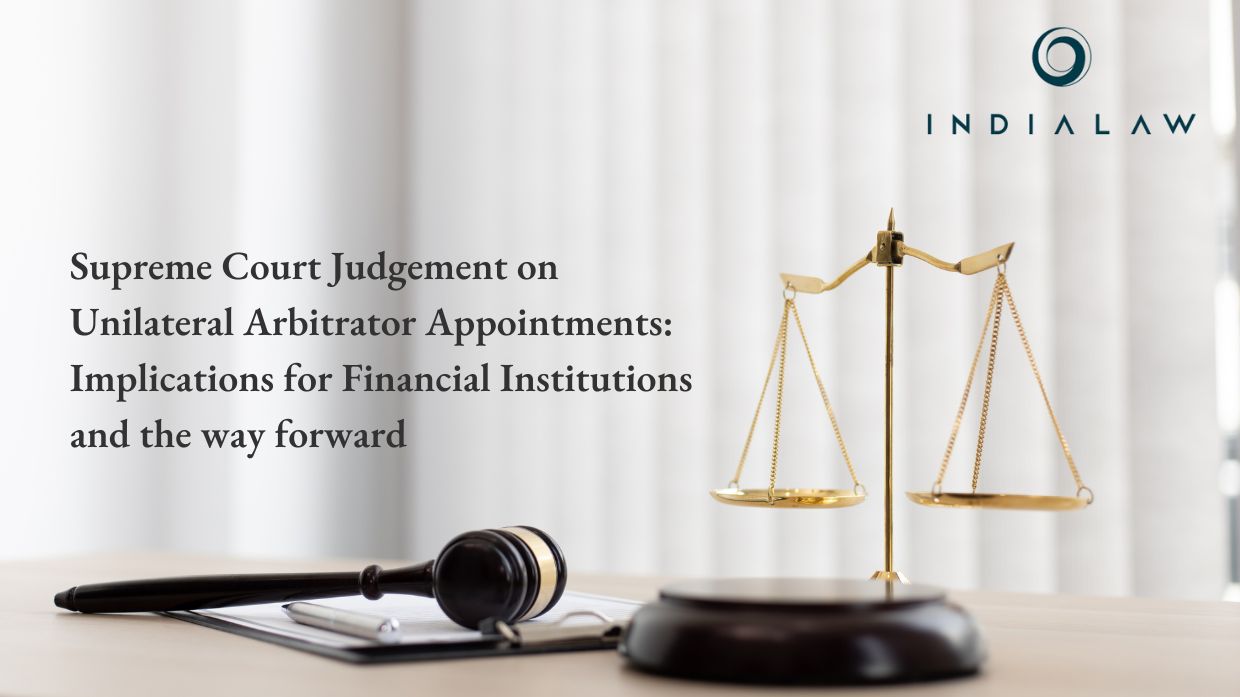Supreme Court Judgement on Unilateral Arbitrator Appointments: Implications for Financial Institutions and the way forward

The Supreme Court of India, in its recent judgment on Central Organisation for Railway Electrification v. M/s ECI SPIC SMO MCML (JV) (November 8, 2024), addressed the legality of arbitration clauses allowing unilateral appointments of arbitrators by public and private sector entities. The Court reinforced the importance of independence and impartiality in arbitration, striking down clauses that permitted one party to have exclusive control over arbitrator appointments, which it considered a violation of equality principles under Article 14 of the Constitution.
Key Findings and Majority Opinion
The judgment, delivered by Chief Justice D.Y. Chandrachud, Justice Pardiwala, and Justice Manoj Mishra, centred on promoting fair play in the arbitration appointment process. Key conclusions of the majority opinion include:
Equality in Appointment
- The Court highlighted the principle of equal treatment under Section 18 of the Arbitration Act, mandating that both parties must have an equal say in selecting arbitrators. The judgment dismissed practices that allowed one party to appoint arbitrators solely from a panel they selected, as this undermines balanced decision-making.
Concerns over Unilateral Appointments and Independence
- Clauses permitting the unilateral appointment of a sole arbitrator or panel raise significant doubts about the arbitrator’s independence and impartiality. Such clauses, the Court noted, tend to favour the appointing party disproportionately, compromising the fairness of arbitration proceedings.
Prospective Application of the Judgment
- To avoid disruption of existing commercial arrangements, the Court ruled that judgement would apply prospectively to the three member arbitrator appointments to be made after the date of this judgment.
Dissenting Judgments and Opinions
While the majority judgment firmly endorsed equality in arbitrator appointments, separate judgments by Justice Hrishikesh Roy and Justice P.S. Narasimha presented more nuanced perspectives. Justice Roy recognized the principle of party autonomy in arbitration but cautioned against invoking constitutional doctrines in arbitration law, advocating for adherence to the Arbitration Act’s framework to ensure fairness. Justice Narasimha expressed concerns about invalidating unilateral clauses in all cases, suggesting that each dispute should be assessed individually, especially where high-volume, low-value claims might necessitate practical and efficient arbitration setups.
Implications for Banks and NBFCs
The judgment has significant implications for financial institutions, including banks and non-banking financial companies (NBFCs), that have largely relied on unilateral appointment mechanisms in arbitration clauses for loan default-related claims. These clauses enabled banks and NBFCs to expedite arbitration, particularly for resolving high-volume, low-value loan disputes efficiently. However, the Supreme Court’s stance challenges this practice, necessitating revisions to arbitration agreements to ensure adherence to principles of independence and impartiality. The judgment invalidates arbitral awards running into several lacs estimated value over Rupees one lac crore worth financial claims between all the major financial institutions.
Way Forward
Existing Arbitration Proceedings:
- For the many cases currently in arbitration with unilaterally appointed arbitrators, banks and NBFCs may need to withdraw from proceedings and file applications under Section 11 of the Arbitration and Conciliation Act to seek the appointment of a new tribunal. This procedural shift could result in a surge of Section 11 applications, potentially overburdening court resources and undermining the intent of arbitration as an alternative dispute resolution mechanism.
Awards Already Passed by Sole Arbitrators:
- All awards already passed by sole arbitrators appointed unilaterally by one party to the dispute will become unenforceable. These cases would require the appointment of a new arbitrator through a fresh application under Section 11, leading to potential delays, further litigation and high cost.
Future Loan Agreements with Unilateral Arbitration Clauses:
- All loan agreements containing clauses for unilateral appointment of arbitrators would need revision. Financial institutions may explore the possibility of institutional arbitration or online dispute resolution (ODR) platforms, such as ADREdge.com, Presolve 360, Sama etc, which follow internal rules ensuring impartial third-party appointments that meet the standards under the Seventh Schedule of the Arbitration and Conciliation Act.
Agreements for Future Loans Yet to be Disbursed:
- Option 1: Shift to institutional arbitration by including references to an established arbitral institution with independent appointment processes. This option could also extend to online ODR platforms.
- Option 2: Name the mutually agreed one or more arbitrators in the arbitration agreement itself during the execution. However, if the designated arbitrator becomes unavailable, incapacitated, or deceased, parties will have to file application under section 11 of the Act.
Conclusion
The Supreme Court’s decision in the Central Organisation for Railway Electrification case represents a turning point in Indian arbitration law, underscoring the importance of fairness, impartiality, and equality in arbitrator appointments. By invalidating unilateral appointments by interested parties, the judgment signals a shift toward a more balanced framework that enhances the credibility of the arbitration process in India. For banks, NBFCs, and public sector entities, this ruling necessitates contractual reforms to ensure compliance with the principles of neutrality, with options ranging from institutional arbitration to ODR platforms. This landmark judgment is expected to enhance public confidence in the arbitration system and aligns Indian arbitration standards with global practices, fostering a more impartial environment for dispute resolution. This also underscores the importance of having a separate legal framework to handle the high volume of loan recovery proceedings for the financial institutions which are distinct from other complex arbitration disputes.
For any further details please write to contact@indialaw.in
By entering the email address you agree to our Privacy Policy.



